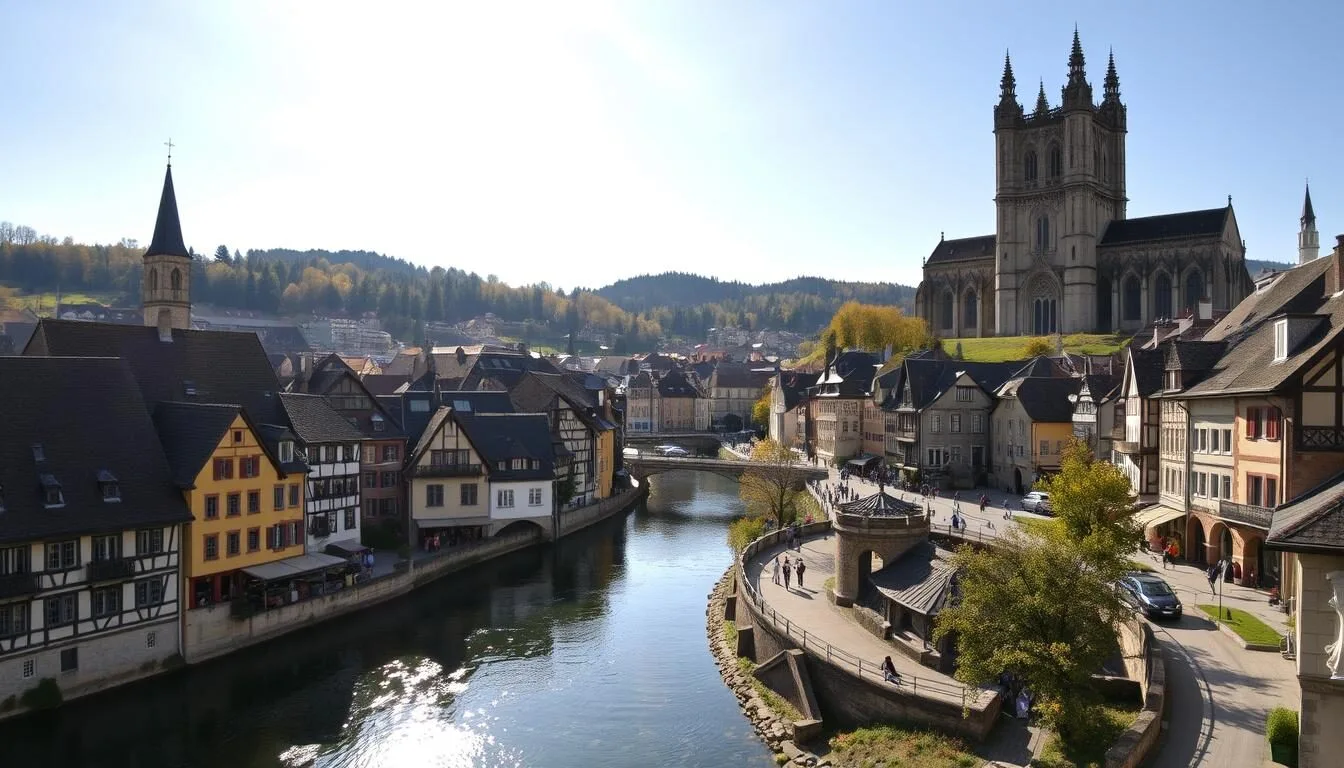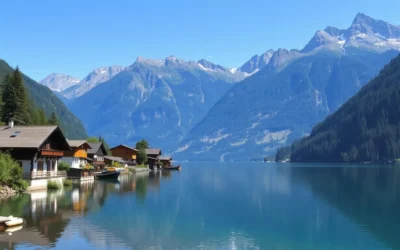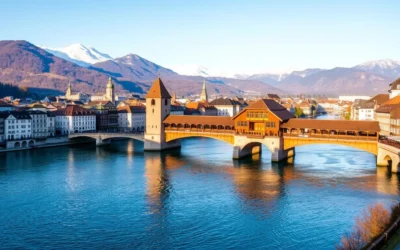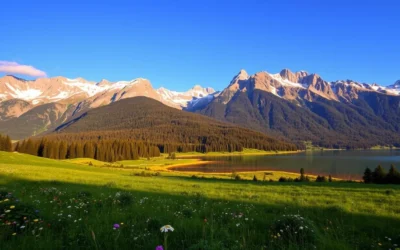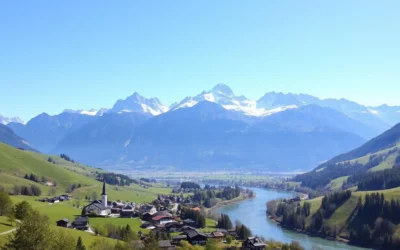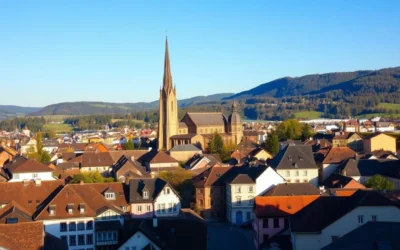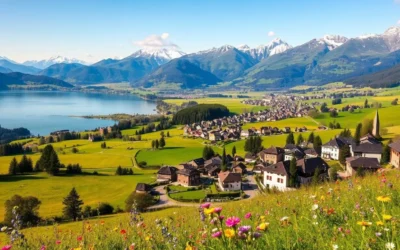✓ Accommodations✓ Flights✓ Rental Cars
Nestled between Geneva and Zurich, Fribourg is a medieval city that boasts breathtaking Gothic architecture and a unique bilingual culture.
As you wander through its cobblestone streets, you’ll be captivated by the city’s charm and history. The Sarine River surrounds the city, offering a picturesque backdrop for your visit.
Explore the city’s top attractions and activities, from visiting historic museums to enjoying the local cuisine. Whether you’re a history buff, a foodie, or an adventure-seeker, Fribourg has something for everyone.
As a university town, Fribourg attracts visitors from around the world, offering a blend of cultural experiences and outdoor adventures that make it an ideal destination.
Discovering the Medieval Charm of Fribourg
As you wander through the cobblestone streets of Fribourg, you’ll uncover the city’s medieval charm. The town Fribourg is home to medieval districts of incomparable charm, where every step reveals a piece of history.
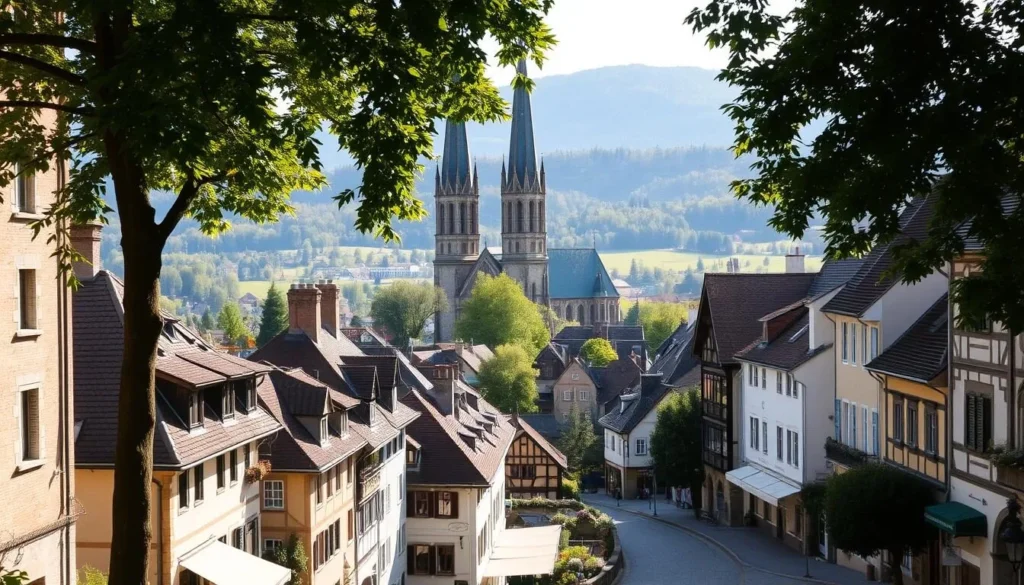
A City Between Two Languages
Fribourg is uniquely situated on the linguistic border between French and German-speaking regions, making it a fascinating place where two cultures blend. This bilingual heritage has significantly influenced the city’s development, contributing to its rich cultural tapestry. You can observe this blend in the city’s architecture, traditions, and even in the daily lives of its inhabitants.
The city’s location in the region Fribourg has made it an important hub for trade and cultural exchange. This strategic position has allowed Fribourg to maintain its medieval character while adapting to the changing political landscapes over the centuries.
Brief History of Fribourg
Fribourg was founded in 1157 by Duke Berthold IV of Zähringen, marking the beginning of its journey as a significant trading center in the medieval period. The city’s foundation in the 12th century laid the groundwork for its future prosperity. As an important trading center, Fribourg accumulated wealth and architectural splendor, characteristics that still define the city today.
Over the centuries, Fribourg has managed to preserve its medieval charm, with its historic architecture and cultural traditions remaining intact. The city continues to be a vibrant city that honors its past while embracing modernity. Visiting Fribourg is like stepping into a living museum, where the essence of the medieval era is palpable in every corner of this charming region Fribourg.
Explore the Charming Old Town
As you step into Fribourg’s old town, you’ll be transported to a world of medieval charm and picturesque beauty. The old town is a place where history comes alive, with its cobblestone streets, ancient architecture, and scenic views.
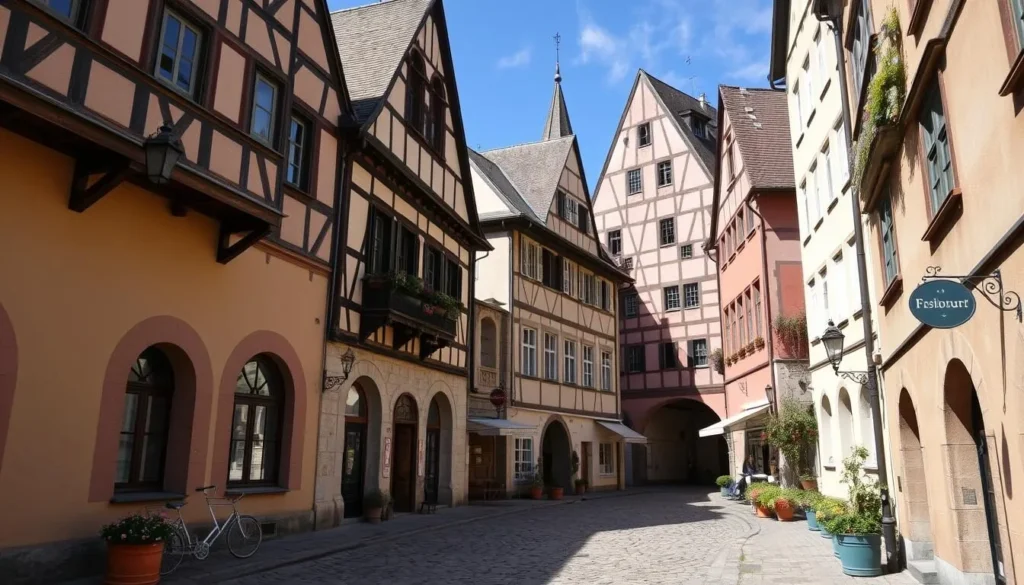
Medieval Architecture and Streets
Fribourg’s old town is characterized by its well-preserved medieval architecture. As you wander through the streets, you’ll notice the historic stone buildings and the picturesque fountains that add to the town’s charm. The old town Fribourg is a treasure trove of historical landmarks, with its roots dating back to the 12th century, making it a significant place in Swiss history.
The narrow streets and alleys invite you to explore and discover the hidden gems of the town. You can walk along the ancient city walls and take in the view of the surrounding landscape.
Best Photo Spots in Old Town
Fribourg’s old town offers numerous viewpoints and places that are perfect for photography enthusiasts. Some of the top photo spots include:
- Capture stunning panoramic views of the old town from the Zähringer Bridge.
- Photograph the iconic Cathedral of St. Nicholas towering over the old town’s red rooftops.
- Discover the picturesque Bern Bridge (Pont de Berne) with its wooden roof.
- Explore the small squares and fountains throughout the old town.
- Visit the Lorette Chapel viewpoint for a spectacular vista of the entire old town.
Timing your visit for golden hour can make your photos truly magical, as the medieval stone buildings glow in the warm light. You can also capture the contrast between the lower and upper towns connected by steep staircases and the historic funicular, showcasing the unique character of 1700 Fribourg.
Climb St. Nicholas Cathedral Tower
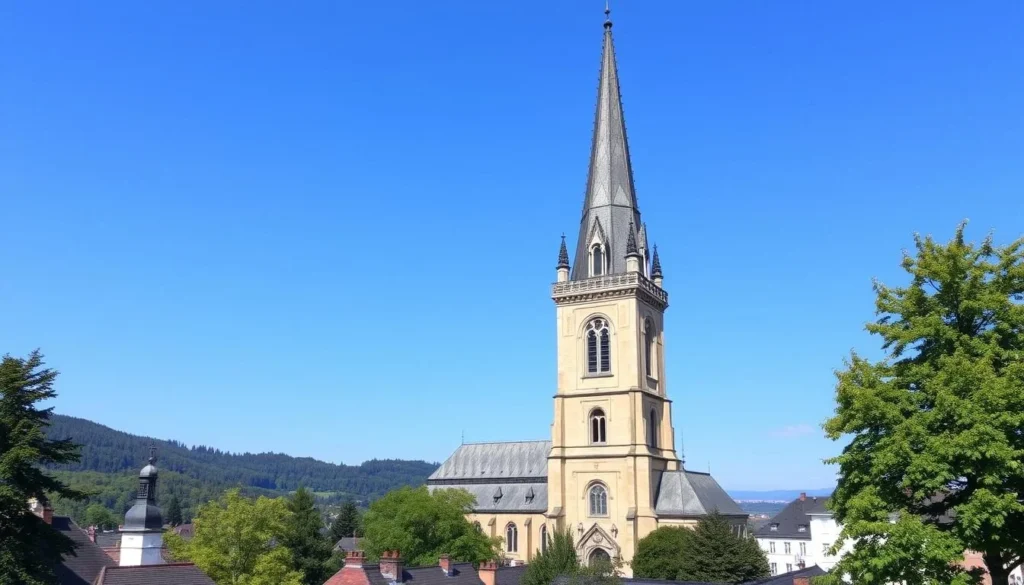
One of the top experiences in Fribourg is ascending the tower of St. Nicholas Cathedral, where stunning views await. As you climb the 365 steps to the top of the 74-meter-tall tower, you’ll be rewarded with breathtaking vistas of Fribourg’s quaint streets and historic rooftops.
The Gothic Cathedral’s Interior and Stained Glass
Before you start your ascent, take a moment to appreciate the beautiful Gothic architecture of St. Nicholas Cathedral. The interior is adorned with stunning stained glass windows that filter in colorful light, creating a serene atmosphere. The cathedral itself is a significant landmark in Fribourg, and its strategic location was chosen for its importance as a religious building.
Panoramic Views from the Tower
As you reach the summit, you’ll be treated to 360-degree panoramic views of Fribourg’s medieval rooftops and winding streets. You can gaze out at the stunning landscape beyond the city, including the meandering Sarine River and the distant pre-Alpine mountains. The view is perfect for capturing memorable photographs of Fribourg’s unique topography.
Some highlights of your climb include:
– Challenging yourself to climb the 365 steps to reach the top of the tower.
– Experiencing changing perspectives as you ascend, with glimpses of the city through narrow windows.
– Reaching the summit for breathtaking views of Fribourg’s historic city and beyond.
– Capturing perfect photographs of the city’s unique landscape.
– Appreciating the strategic location of the cathedral.
– Timing your visit for sunset to see the city bathed in a warm, golden light.
Climbing St. Nicholas Cathedral’s tower is an unforgettable experience in Fribourg, offering a unique perspective on this historic city. Be sure to take your time and enjoy the views from the top – it’s an experience that will stay with you long after you leave Fribourg.
Cross the Historic Bridges of Fribourg
Fribourg, a city nestled between the banks of the Sarine River, boasts an impressive array of historic bridges. As you explore this charming city, you’ll have the opportunity to cross from one bank to the other, discovering the rich history and architectural diversity that Fribourg’s bridges have to offer.
Bern Bridge (Pont de Berne)
The Bern Bridge, or Pont de Berne, is one of Fribourg’s most iconic medieval bridges. Its timber roof and stone construction make it a standout example of the city’s historical engineering prowess. As you walk across this bridge, you’ll be transported back in time, taking in the picturesque views of the Sarine River below.
St. John’s Bridge (Pont St-Jean)
St. John’s Bridge, or Pont St-Jean, is another significant historic bridge in Fribourg. This medieval stone bridge has been a crucial crossing point in the city for centuries, connecting different parts of Fribourg and facilitating trade and commerce. Today, it remains a vital part of the city’s infrastructure and a popular spot for tourists.
Other Notable Bridges
Beyond the Bern Bridge and St. John’s Bridge, Fribourg is home to numerous other notable bridges. The Middle Bridge (Pont du Milieu) and the Zähringer Bridge are examples of the city’s medieval engineering, while the modern Poya Bridge stands as a testament to contemporary architectural innovation. Each bridge offers a unique perspective on Fribourg’s history, culture, and natural beauty.
As you explore Fribourg, consider taking a dedicated “bridge tour” to fully appreciate the diversity and historical significance of these structures. You’ll discover how these bridges not only connected different parts of the city but also symbolized Fribourg’s importance as a trading center in the region Fribourg. The variety of architectural styles represented in Fribourg’s bridges, from medieval stone arches to modern engineering marvels, is truly remarkable.
Ride the Funicular
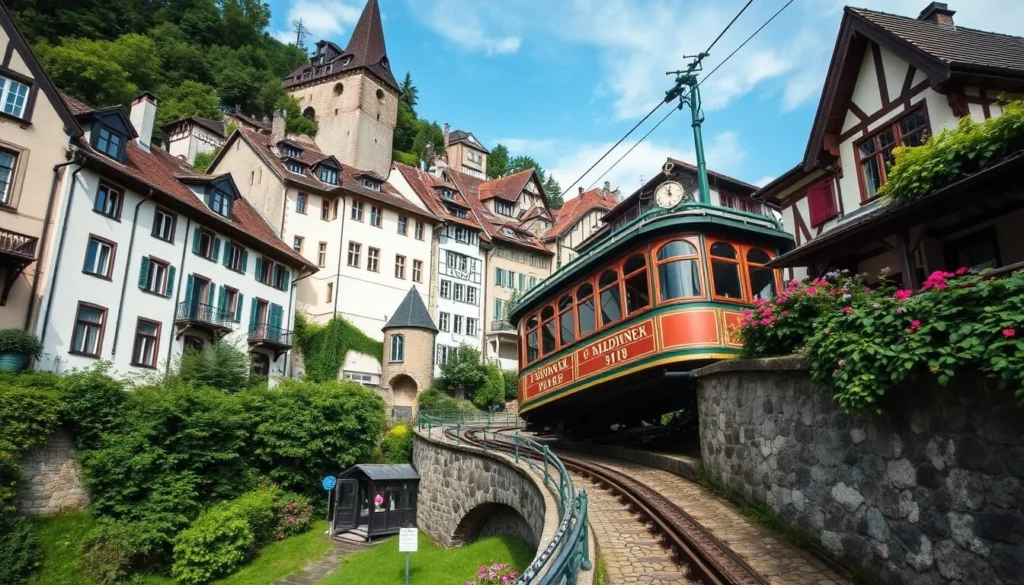
Fribourg’s funicular, affectionately known as the “Funi,” offers a unique glimpse into the city’s past. This historic ride not only connects the upper and lower parts of the city but also provides a charming experience for visitors.
History of the Water-Powered “Funi”
The Fribourg funicular has a rich history, dating back to its construction in the early 20th century. Initially powered by water, it has been in operation for over a century, making it a significant part of Fribourg’s heritage. The funicular’s water-powered system is a testament to the ingenuity of its time, utilizing the difference in water levels between the upper and lower tanks to propel the cabins.
Operational since 1899, the “Funi” has seen minimal changes to its original mechanism, making it a living museum piece that continues to fascinate visitors.
What to Expect During the Ride
As you ride the funicular, you’ll experience the charming journey between the medieval upper town (Haute-Ville) and the lower town (Basse-Ville). The nostalgic atmosphere is created by the wooden cabins and the unique sounds of this historic transportation system. You’ll also notice the distinctive scent that comes from the wastewater counterbalance system, adding to the authentic historical experience.
- Capture beautiful views of the Sarine River and the old town as the funicular makes its 56.4-meter ascent or descent.
- Watch the funicular operator manually control the cabin, demonstrating the traditional operation that has remained largely unchanged for over a century.
- Appreciate the slow pace of the journey, allowing you to fully absorb the changing perspectives of Fribourg’s dramatic topography.
- Understand how locals continue to use this practical transportation method in their daily lives, making it both a tourist attraction and an essential service.
Enjoy the unique experience that the Fribourg funicular offers, a blend of history, nostalgia, and scenic views that make it a must-do activity when visiting Fribourg.
Visit the Natural History Museum
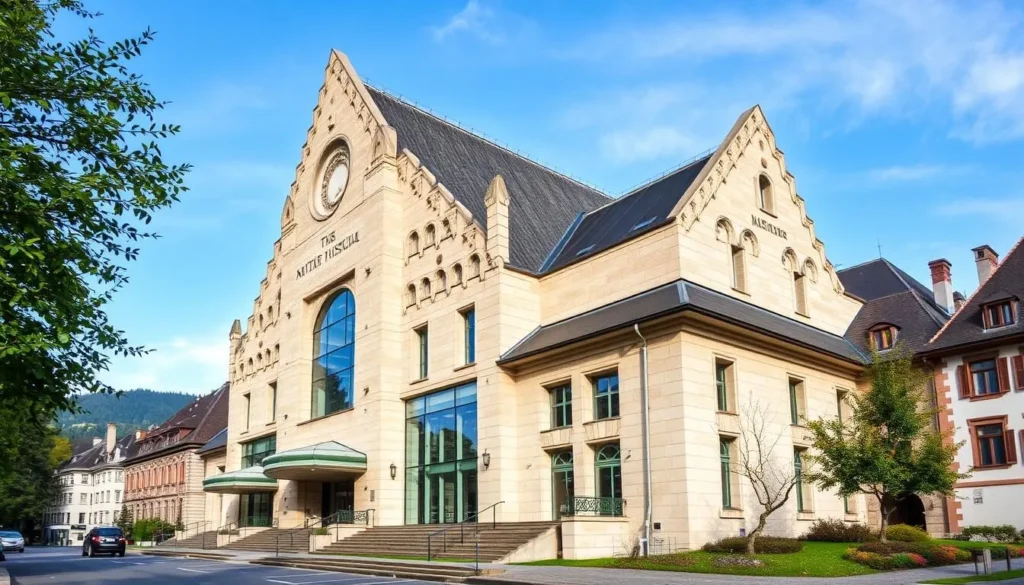
Discover the wonders of the natural world at Fribourg’s Natural History Museum. The museum is a treasure trove of natural history, offering insights into the Earth’s history, the diversity of life, and the latest scientific discoveries.
Main Exhibits and Collections
The Natural History Museum boasts an impressive collection of specimens and artifacts that tell the story of our planet’s past and present. You can explore exhibits on geology, paleontology, and biodiversity, featuring impressive displays of fossils, minerals, and taxidermied animals. The museum’s collections are carefully curated to provide a comprehensive understanding of the natural world.
The exhibits are designed to be informative and engaging, with interactive elements that bring the natural world to life. By examining the museum’s collections, you can gain a deeper appreciation for the complexity and beauty of the natural world.
Interactive Displays and Activities
The museum offers a range of interactive displays and activities that make it an ideal destination for families and visitors of all ages. You can participate in hands-on experiments, workshops, and guided tours that enhance your understanding of natural history. The museum’s interactive displays use the latest technology to make complex scientific concepts accessible and fun.
- Engage with the museum’s interactive displays that bring scientific concepts to life through hands-on experimentation and discovery.
- Participate in the regularly scheduled educational workshops designed for different age groups and interests.
- Bring your family to enjoy the child-friendly activities that make learning about natural history fun and accessible.
- Experience the temporary exhibitions that complement the permanent collection, often focusing on current environmental issues or scientific discoveries.
Explore the Swiss Puppet Museum
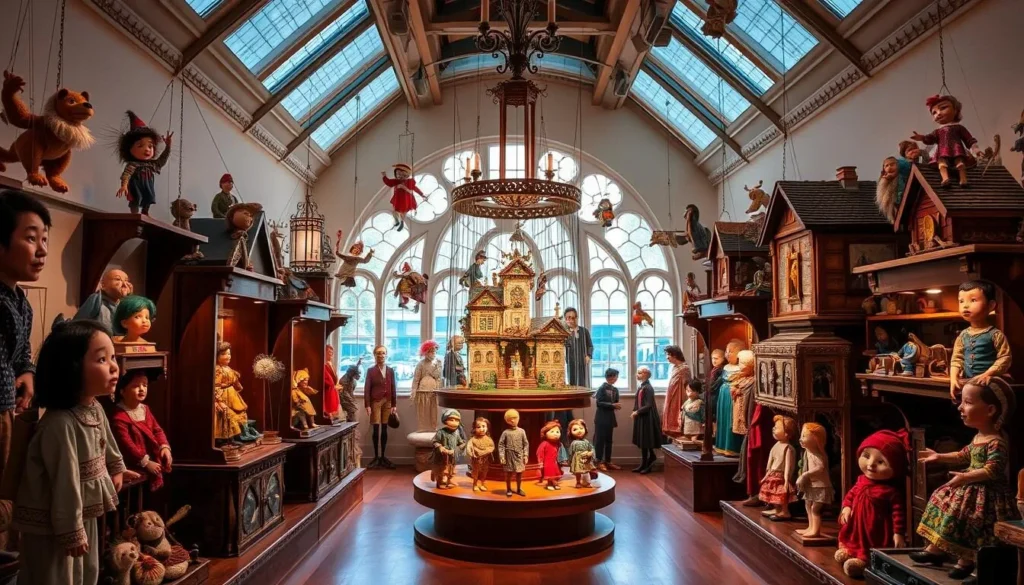
The Swiss Puppet Museum in Fribourg offers an enchanting experience, blending tradition with innovation in the world of puppetry. With a collection of over 3,000 puppets, the museum is a treasure trove for both the young and the young-at-heart.
The Collection of 3,000+ Puppets
The museum’s extensive collection features a wide range of puppets from different cultures and historical periods, providing a fascinating insight into the art of puppetry. You can explore the diverse exhibits, which include hand puppets, shadow puppets, and marionettes, among others. The Swiss Puppet collection is particularly noteworthy, showcasing the rich cultural heritage of Switzerland.
As you wander through the museum, you’ll discover the intricate craftsmanship that goes into creating these puppets, as well as the stories and legends they represent. The collection is not just a visual treat but also an educational experience, offering a unique perspective on the history and evolution of puppetry.
Performances and Workshops
The Swiss Puppet Museum is not just a static exhibit; it’s a vibrant center for activities and engagement. You can participate in hands-on workshops where you can learn to make your own puppet under the guidance of skilled craftspeople. The museum also hosts live puppet performances, showcasing both traditional and contemporary puppetry techniques.
For family fun, the museum offers special children’s activities, including treasure hunts that make exploring the museum an adventure. You can also attend specialized seminars and demonstrations that delve deeper into the art and craft of puppetry. Guided tours led by knowledgeable staff bring the stories behind the puppets to life, enhancing your overall experience.
Be sure to check the museum’s calendar for special events and seasonal performances that offer unique experiences throughout the year. The Swiss Puppet Museum creates an interactive environment where you don’t just observe puppets but can engage with this ancient art form directly.
Discover the Bible and Orient Museum
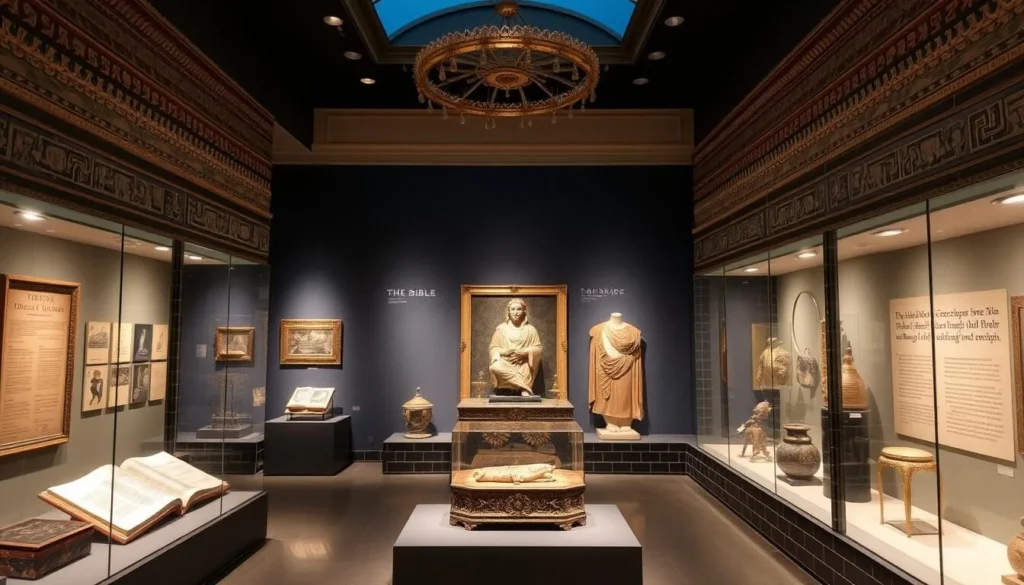
The Bible and Orient Museum in Fribourg offers a fascinating journey through the ancient world and its connection to biblical texts. As you explore the museum, you’ll uncover a vast array of artifacts that provide insights into the cultures and civilizations of the ancient Near East.
Ancient Artifacts and Exhibits
The museum’s collection includes a wide range of artifacts, from ancient seals to pottery and other relics. You can participate in the museum’s creative workshops where you can design original artwork inspired by ancient seals and artifacts.
Some highlights of the museum’s exhibits include:
- Ancient Mesopotamian artifacts
- Egyptian relics and mummies
- Ancient texts and biblical manuscripts
Educational Programs and Tours
The Bible and Orient Museum offers a variety of educational programs and guided tours. You can join specialized guided tours led by experts who provide deeper insights into the historical and cultural significance of the exhibits.
Some of the educational activities include:
- Attending educational lectures and seminars
- Engaging with interactive learning stations
- Taking advantage of the museum’s educational resources, including detailed guidebooks and multimedia presentations
By visiting the Bible and Orient Museum, you not only gain a deeper understanding of ancient civilizations but also appreciate the museum’s commitment to making complex historical and archaeological concepts accessible to the general public.
Enjoy the University Botanical Garden
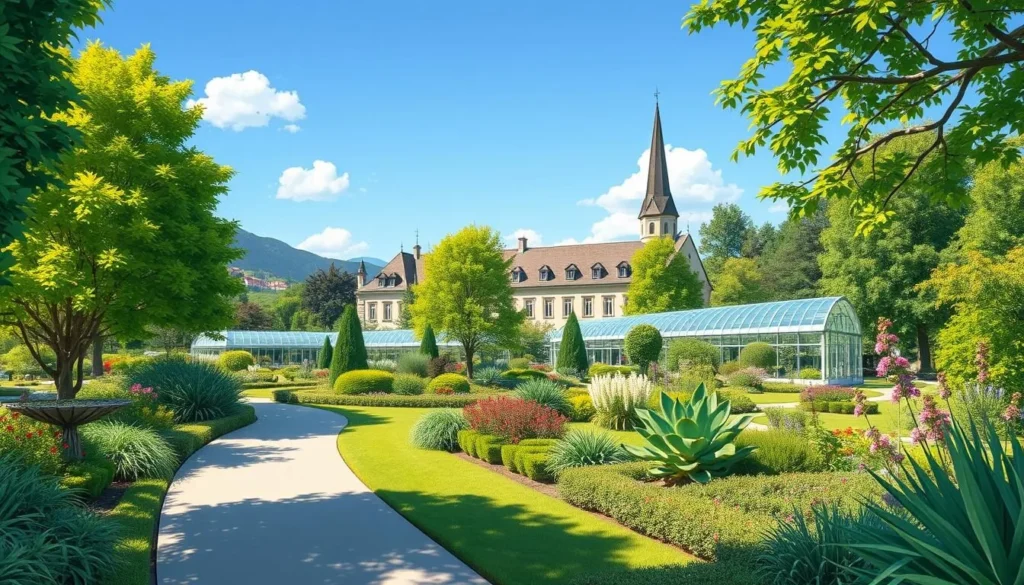
Discover the beauty of the natural world at the University Botanical Garden, a tranquil oasis in the heart of Fribourg. This botanical haven is not just a place to visit; it’s an experience that combines education, relaxation, and interaction with nature.
Plant Collections and Greenhouses
The University Botanical Garden boasts an impressive collection of plants from around the world, housed within its serene greenhouses. As you stroll through the garden, you’ll encounter a diverse range of flora, from exotic species to native Swiss plants. The garden is meticulously maintained, offering a unique opportunity to learn about various plant species and their habitats.
Explore the variety of plant collections, including tropical plants, alpine flora, and medicinal herbs, each providing insight into the botanical world’s vast diversity.
Seasonal Highlights and Events
The garden transforms with the seasons, offering a new experience with each visit. In the spring, the blossoming flowers create a colorful tapestry, while autumn brings a kaleidoscope of foliage colors. The garden hosts various seasonal events and activities, including guided tours, workshops, and plant sales.
You can participate in botanical drawing classes, photography workshops, or simply enjoy the peaceful atmosphere. The garden’s calendar is filled with events that cater to different interests, making it a vibrant community hub.
Some highlights include visiting “La Cabane des Arbres,” a recently opened space that hosts workshops and interactive activities related to trees and forest ecosystems. You can also plan your visit according to the seasons to experience different botanical highlights.
Admire the Medieval Fountains
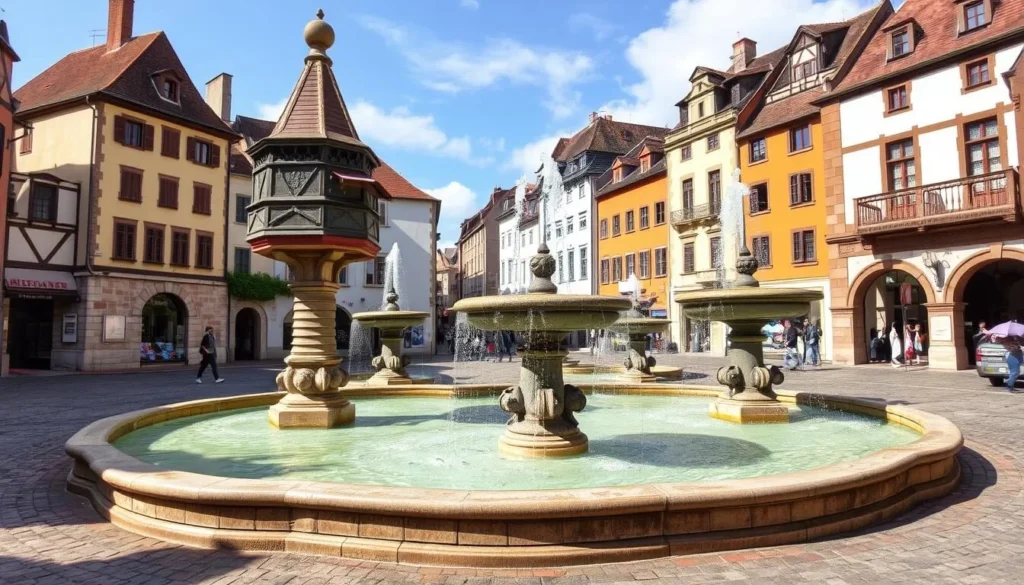
As you wander through Fribourg, you’ll discover a series of historic fountains that add to the city’s medieval allure. These fountains are not just aesthetically pleasing but also hold significant historical value, making them a must-see during your visit.
The 11 Historic Fountains
Fribourg boasts an impressive collection of 11 medieval fountains, each with its unique character and history. These fountains have been meticulously preserved and continue to be an integral part of the city’s landscape. As you explore the old town, you’ll come across fountains such as the St. Anne’s Fountain and the Samson Fountain, which are notable for their intricate designs and historical significance.
Jo Siffert Fountain by Jean Tinguely
Among Fribourg’s medieval fountains, the Jo Siffert Fountain stands out as a modern contrast. Designed by the renowned Swiss artist Jean Tinguely in 1984, this fountain pays tribute to Jo Siffert, a Formula 1 driver from Fribourg who tragically died in a racing accident. The fountain features a magnificent black iron sculpture that interacts with water, creating a dynamic visual experience. Tinguely’s work is characterized by its kinetic design, and this fountain is no exception, with moving metal parts that create an ever-changing water display.
The Jo Siffert Fountain is not only a tribute to a local hero but also a representation of Jean Tinguely’s artistic genius. Tinguely was known for his collaborations with other artists, including Niki de Saint Phalle, whose work is also represented in Fribourg. The fountain’s location in the Grand-Places area makes it a central gathering point for both locals and visitors, bridging centuries of artistic expression in the city.
Visiting the Jo Siffert Fountain offers a unique opportunity to appreciate modern art in the context of Fribourg’s medieval architecture. It’s a reminder of how art and history blend seamlessly in this charming Swiss city, making it a fascinating place to explore.
Fribourg, Switzerland: Best Things to Do – Top Picks for Art Lovers
As you wander through Fribourg, you’ll discover a vibrant art scene that reflects the city’s rich heritage. The city is a treasure trove for art enthusiasts, offering a mix of historical and contemporary art.
Jean Tinguely and Niki de Saint Phalle’s Legacy
Fribourg is closely associated with the works of Jean Tinguely and Niki de Saint Phalle, two influential artists of the 20th century. Their legacy is evident in various public artworks and exhibitions throughout the city. You can explore the Jo Siffert Fountain by Jean Tinguely, a notable example of his kinetic art. The city’s connection to these artists is a significant part of its cultural identity, making it a fascinating place for art lovers to visit and experience the blend of traditional and modern art.
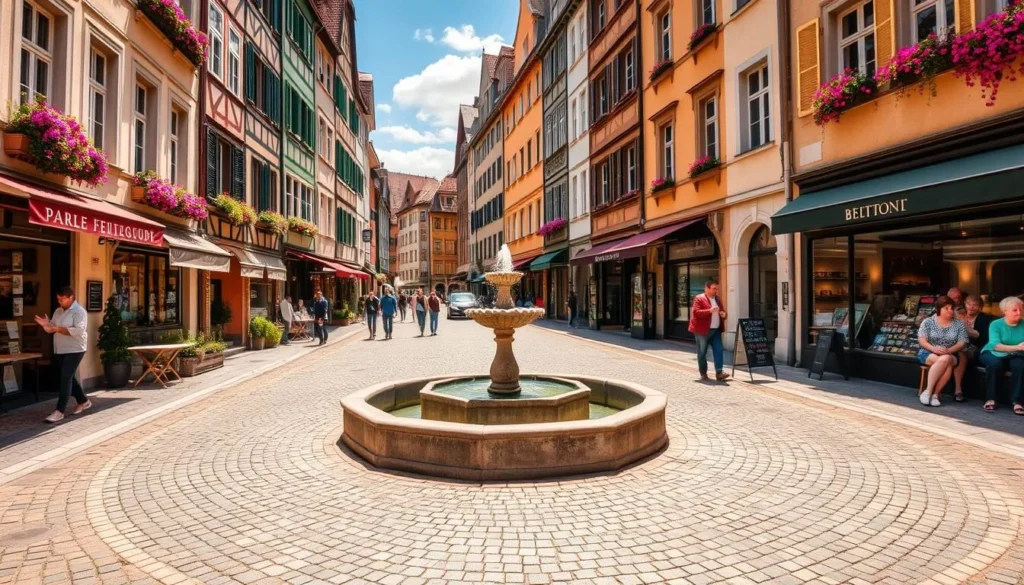
Art Galleries and Exhibitions
Fribourg hosts several art galleries and regular exhibitions showcasing both local and international artists. You can visit the Fri-Art Centre d’Art Contemporain, which features cutting-edge contemporary art. The Museum of Art and History houses an impressive collection spanning from the Middle Ages to contemporary works, offering visitors a comprehensive art experience.
| Gallery/Exhibition | Focus | Highlights |
|---|---|---|
| Fri-Art Centre d’Art Contemporain | Contemporary Art | Rotating exhibitions of international and Swiss artists |
| Museum of Art and History | Historical to Contemporary Art | Comprehensive collection from the Middle Ages onwards |
| Gutenberg Museum | History of Printing | Exhibitions on book production and typography |
To fully appreciate Fribourg’s art scene, consider taking a guided art tour. This will provide you with context and background information on the various artistic highlights of the city, enhancing your overall experience as a visitor.
Shopping and Dining in Fribourg
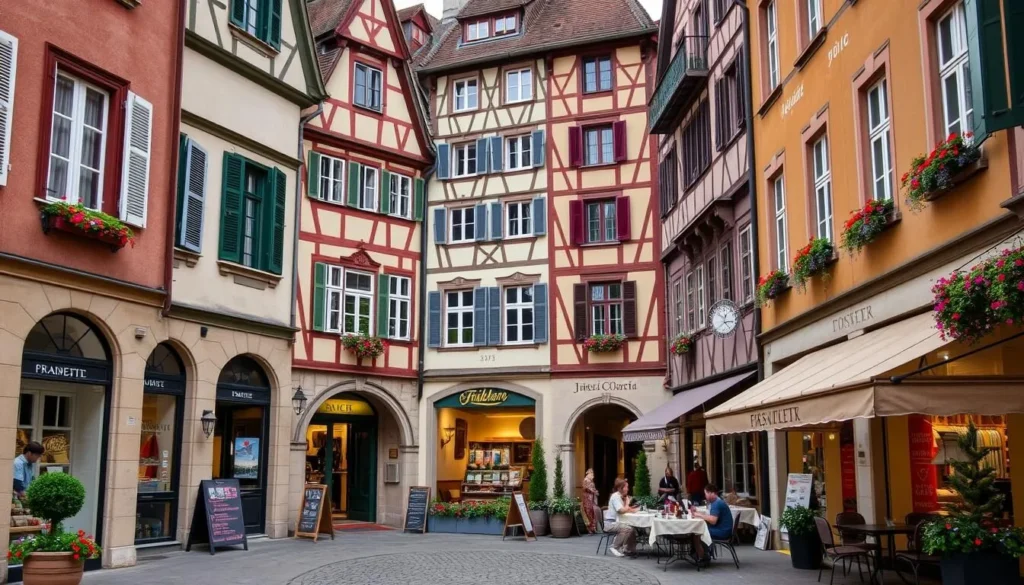
As you wander through Fribourg, you’ll discover a treasure trove of shopping and dining options that reflect the city’s rich cultural heritage. The city offers a variety of dining experiences, from traditional Swiss cuisine to international flavors, making it a culinary destination in its own right.
Fribourg Centre and Boutique Shopping
Fribourg’s city center is a shopper’s delight, with a range of boutique stores offering unique products. You can explore the cobblestone streets and discover local artisans selling handmade crafts and specialty items. The city’s shopping scene is characterized by its blend of traditional and modern stores, providing something for every taste and preference.
When in Fribourg, be sure to visit the local boutiques and shops in the city center, where you can find distinctive souvenirs and gifts. The region’s rich cultural heritage is reflected in its shopping, with many stores offering products that highlight the local craftsmanship and traditions.
Local Cuisine and Restaurants
Fribourg is renowned for its culinary traditions, which blend French and German influences to create distinctive local specialties. You can savor the unique flavors of the region by trying Fribourg’s famous Gruyère cheese, often featured in dishes like fondue moitié-moitié. Another local favorite is Cuchaule, a traditional saffron bread often served with Bénichon mustard, a sweet and spicy condiment unique to the region.
The city’s diverse dining scene includes everything from casual cafés and bistros to fine dining establishments. You can enjoy dining on terraces overlooking the Sarine River or in historic buildings in the old town, adding to the ambiance of your meal. For a deeper culinary experience, consider taking a culinary tour to learn about the region’s food traditions and sample specialties from various establishments throughout the city.
Take a Day Trip to Gruyères
A day trip to Gruyères from Fribourg allows you to explore a quintessential Swiss town, rich in history and culinary delights. Gruyères is famous for its medieval castle and, of course, its cheese production.
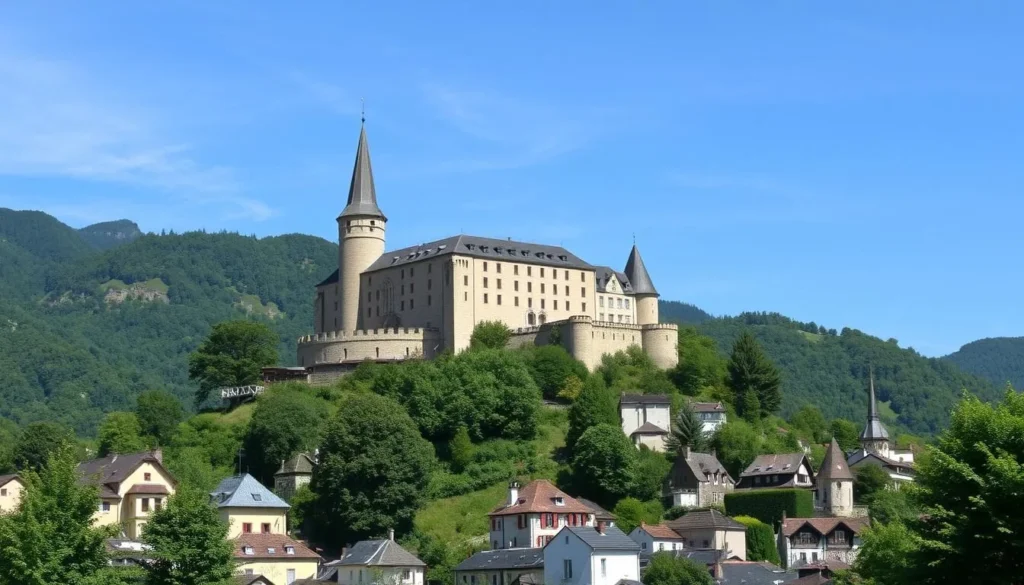
Gruyères Castle and Old Town
Gruyères Castle is a must-visit attraction in the town, offering a glimpse into the region’s rich history. The castle’s architecture and the surrounding old town are well-preserved, making it a charming place to explore. As you wander through the narrow streets, you’ll discover quaint shops and restaurants, adding to the town’s charm.
During your visit, be sure to explore the castle’s interiors, which feature an impressive collection of art and artifacts. The old town itself is also worth a leisurely stroll, with its picturesque streets and historic buildings.
La Maison du Gruyère Cheese Factory
No trip to Gruyères would be complete without a tour of La Maison du Gruyère, an active cheese factory where you can witness the traditional production of Gruyère AOP cheese. This interactive experience allows you to learn about the cheese-making process, from fresh milk to aged wheels.
You’ll have the opportunity to watch actual cheese production through viewing windows, with demonstrations taking place several times daily. You can also visit the exhibition to understand the cultural significance of cheese-making in the region Fribourg and sample different ages of Gruyère cheese.
After your visit, you can purchase authentic Gruyère cheese directly from the source, along with other regional dairy products and souvenirs, making it a great place to pick up some unique gifts.
Outdoor Activities Around Fribourg
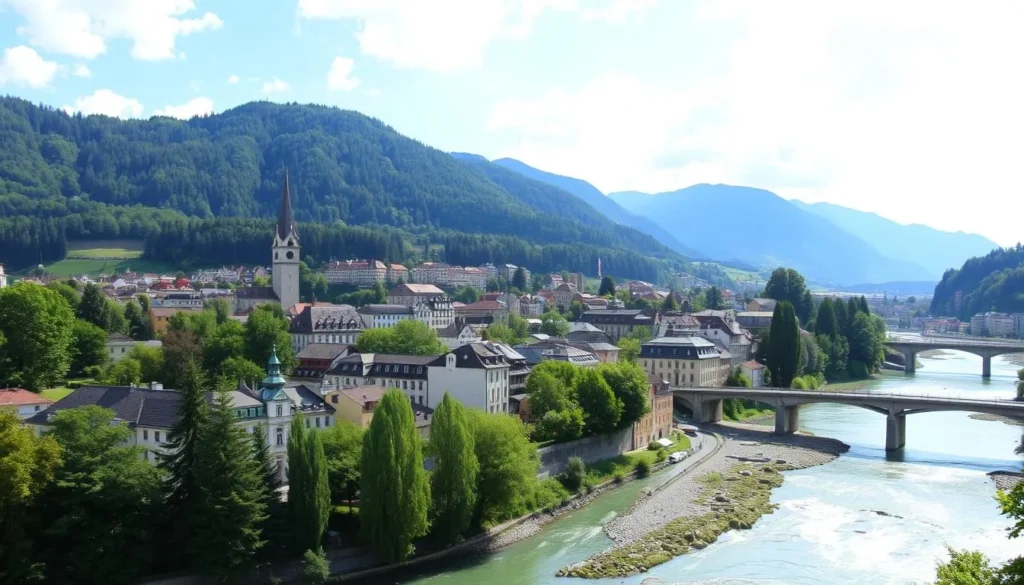
The region around Fribourg is a treasure trove of natural beauty, waiting to be explored through various outdoor activities. Whether you’re an avid hiker or just looking to enjoy the scenery, Fribourg has something for everyone.
Hiking Along the Sarine River
The Sarine River flows gently through the landscape, offering a serene backdrop for a leisurely hike. You can follow the riverbank paths, enjoying the region’s natural beauty and the soothing sounds of the water. This experience is perfect for families or those looking for a relaxing outdoor activity.
Exploring Gantrisch Nature Park
Gantrisch Nature Park is a haven for outdoor enthusiasts, boasting over 350 km of hiking trails that wind through pristine Alpine landscapes. As you hike through the park, you’ll experience the rich biodiversity of the area, from vibrant mountain meadows to dense forests and crystal-clear streams.
The park is also home to a variety of wildlife, including deer, chamois, and marmots. You can participate in various activities throughout the year, from summer hiking and mountain biking to winter snowshoeing and cross-country skiing.
In addition to its natural beauty, Gantrisch Nature Park is designated as a “Dark Sky Park,” offering minimal light pollution and excellent stargazing opportunities. You can also visit traditional Alpine farms within the park, where age-old farming practices continue, and local products are produced.
By engaging in outdoor activities in and around Fribourg, you’re not only enjoying the nature but also supporting conservation efforts. Sustainable tourism helps preserve this region Fribourg for future generations, making your visit a valuable part of the local community’s efforts to protect its natural heritage.
Practical Information for Visiting Fribourg
As you prepare for your journey to Fribourg, knowing the ins and outs of getting around and when to visit can enhance your experience in this charming city.
Getting Around with the Fribourg Card
The Fribourg Card is your key to exploring the city and its surroundings. With this card, you can enjoy free public transportation, including buses and the historic funicular, making it easy to visit major attractions. The card also offers discounts at various local businesses and museums, enhancing your overall experience.
- Use the Fribourg Card for free travel on public buses and the funicular.
- Benefit from discounts at local shops and attractions.
- Explore the city’s historic areas without worrying about transportation costs.

Best Time to Visit and Accommodation Tips
Fribourg can be visited year-round, with each season offering a unique experience. Late spring (May-June) and early fall (September-October) are ideal for exploring the city and its surroundings due to the pleasant weather.
- Plan your visit during late spring or early fall for the best weather.
- Consider summer for festivals, but be prepared for higher prices.
- Experience the charm of Fribourg in winter with its occasional snowfall and Christmas markets.
- Choose accommodation in the city center to maximize the benefits of the Fribourg Card.
- Opt for boutique hotels or guesthouses in the old town for an immersive experience.
- Book in advance during peak season to secure your preferred accommodation.
By planning your visit to Fribourg carefully, you can enjoy a memorable experience in this historic city within the region Fribourg.
Conclusion
As you wander through the cobblestone streets of Fribourg, you’ll discover a city that seamlessly blends medieval charm with modern vibrancy. Fribourg, Switzerland, is a treasure trove of historical landmarks, cultural experiences, and natural beauty, making it an unforgettable experience for visitors.
Fribourg’s unique position as one of Europe’s most beautiful and well-preserved medieval towns offers visitors an authentic glimpse into Switzerland’s past. The city’s distinctive character as a bridge between French and German cultures creates a rich bilingual environment that enhances the visitor experience. This blend of cultures is evident in the city’s architecture, cuisine, and cultural events, making Fribourg a fascinating place to visit.
The city’s diverse attractions make it worth visiting, from its stunning Gothic architecture and historic bridges to its fascinating museums and beautiful natural landscapes. You can enjoy a range of activities, including hiking along the Sarine River, exploring the Gantrisch Nature Park, or simply soaking up the atmosphere in the charming Old Town. Fribourg is also an excellent base for exploring the wider region of Fribourg, including the picturesque town of Gruyères.
Fribourg is easily accessible, with excellent transportation connections and visitor-friendly services. This makes it an ideal destination for travelers looking to explore beyond the usual tourist trails. By visiting Fribourg, you’ll experience an authentic Swiss destination that rewards those who venture off the beaten path.
In conclusion, Fribourg is a hidden gem that offers a unique blend of history, culture, and natural beauty. Whether you’re interested in exploring medieval architecture, enjoying outdoor activities, or simply experiencing the local culture, Fribourg has something for everyone. As you plan your trip to Switzerland, be sure to include Fribourg in your itinerary and discover the charm of this incredible region of Fribourg.
The above is subject to change.
Check back often to TRAVEL.COM for the latest travel tips and deals.
